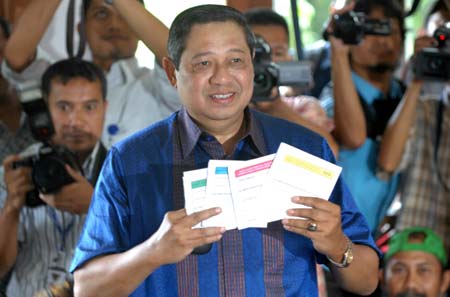The DP may well still qualify to nominate its own presidential and vice-presidential candidates by winning at least 20 per cent of the seats in the national legislature. But getting a fourth or more of the popular vote on Thursday would have been a real boost for SBY going forward to the 8 July first-round presidential election.
Compared with his predecessors, SBY is the best (or least worst) president Indonesia has had, leaving aside Sukarno’s role in achieving independence and fashioning a non-sectarian national identity. A serious weakness of the present government, however, is that its coalitional character has obliged SBY to accept, as ministers, people of questionable competence who are in the cabinet because this or that party in the ruling coalition wanted them there, and whom SBY cannot remove without disrupting that coalition.
Admittedly, the estimated 20 per cent share of the vote won by the DP on Thursday is nearly triple the proportion it won in the last legislative election in 2004. This time around, SBY will have less need to compromise with other parties in coalition politics. But a convincing win of 25 per cent or more of the votes on 9 April would have considerably strengthened both his momentum toward re-election on 8 July (or in second-round balloting on 8 September, if a run-off is required) and his ability to make good cabinet appointments thereafter.
The Islamist parties on Thursday did not do well. Nevertheless, SBY has already said that one of these parties, the PKS, ‘is likely to be in’ his PD-led coalition. On the one hand, such a move could help sustain anti-corruption efforts by a second SBY administration. The PKS has been especially vocal about the need for cleaner government. Inside the PKS, however, some leaders are more intolerantly Islamist than others. If the PKS had not been part of his ruling coalition during his first presidential term, SBY might have been less timid about curbing expressions of religious intolerance in Indonesia, and correspondingly bolder in defence of religious freedoms.
The 2009 presidential election is SBY’s to lose. But including the PKS once again in his coalition could mean that, despite the Democrat Party’s strong showing on 9 April, a second SBY administration will not oppose more forthrightly the growth of harder-line versions of Islam in Indonesia.
The electoral news from Indonesia is good. But it could have been even better, had SBY’s Democrat Party won at least a quarter of Thursday’s vote.
Professor Donald K. Emmerson heads the Southeast Asia Forum in the Shorenstein Asia-Pacific Research Center at Stanford University.

